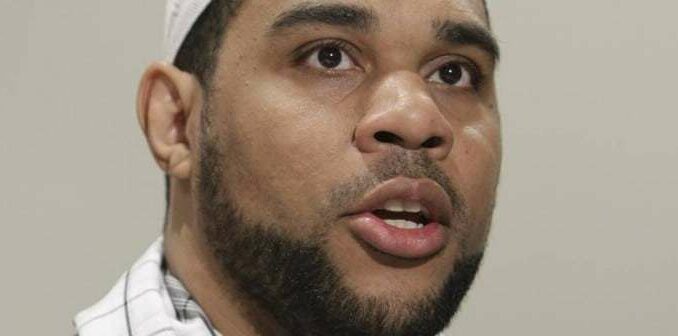
Blacks are the largest group of American Muslims. Yet, they are almost absent of leadership positions in the biggest US Muslim groups.
Blacks make up almost one third of Muslims in America. Yet, if one looks at the major institutions controlled by Islamists in America, there are not many to be found in top leadership positions. Real power remains concentrated in the old guard of South Asian and Arab elites.
I hear grumbling about this from African American friends who resent being shut out. But some complaints are coming from inside the system.
Dawud Walid of CAIR Calls out Racism within Major Muslim Organizations
Dawud Walid has been the Executive Director of the Michigan chapter of Council on American-Islamic Relations (CAIR) since 2004. In 2013, he wrote on his blog about the use of the derogatory term “abeed” (literally “slave”) that some Arabs use to refer to blacks: “The most overt discrimination that I see on Twitter is Arab on black racism.”
A few years later, he wrote a piece for The Muslim Vibe on “Addressing intra-Muslim racism in the institutions of organizations and marriage.” In particular, Walid slammed the lack of diversity in the leadership of Muslim groups in America. This “ethnic chauvinism” is an issue throughout Islamist-led organizations:
Besides one national organization, the rest do not come anywhere close to representing the diversity of the American Muslim community. A majority of them are South-Asian and/or Arab-American dominated organizations that project themselves as inclusive but are in fact facades of inclusivity.
According to Walid: “Black are deemed good enough to speak at national conferences and fundraisers. [this] reflects the implicit bias which exists in these organizations. when it comes to the board of trustees, the country and the village of that country becomes a prerequisite in many Masjids. though not explicitly stated in the by-laws, about who can serve in leadership capacities.”
Dawud Walid’s Organized Attempt to Address Intra-Muslim Racism
Walid qualifies his criticism with the phrase: “besides one national organization.” But he doesn’t say which group this is. It seems unlikely he means his employer CAIR, which has effectively been Nihad Awad’s doman since its founding 25 years ago.
It seems Walid doesn’t want to overtly criticize his employer, especially on such an emotional and divisive topic.
A few years earlier, in 2014, Walid helped start a new nonprofit called the Muslim Anti-Racism Collaboration (MuslimARC). In the promo video, Walid recounted how he was subjected to racism going to a Muslim school.
Most of the individuals appearing in the video are also black, including Asma Hanif. She shares how once she noticed other Muslims on her prayer line distance themselves from her for being black. In an uncut version of that interview, Hanif complains tearfully about the racism she had to deal with from her Muslim peers.
They did not quite trust her with the money she collected for the homeless shelter she ran in Michigan.
The open discussion about challenges inside our community is refreshing – and also heart-breaking.
Anti-Black Racism Rooted Out?
The emergence of Muslim groups led by blacks is a great development. But how effective have such groups been in breaking the hegemony Arabs and South Asians hold over Muslim groups? As of today, it doesn’t look like a major shift has taken place. Two factors may be worth considering to explain that.
For starters, Arab and South Asians have a far more sophisticated fundraising networks. this gap is hard to bridge by virtue of the income disparity between them and African-American Muslims. A survey from ISPU of the community explains: “
Black Muslim households are more likely than any other Muslim racial group to earn less than $30,000 a year. More racial parity exists at the higher end of the income spectrum, with Arab households only slightly more likely than other Muslims to report incomes over $75,000.”
That gap helps sustain Arab and South Asian dominance over Black Muslims. until Black Muslims can have their voices backed by the power of their dollars true equality will not be achieved. Money talks – and helps Arabs and South Asians preserve their dominance despite the Black demographic advantage.
This may explain why the board of directors of MuslimArc is now mostly devoid of the African Americans from its launch video. The organization has rephrased and buried the original launching slogan (“Fighting racism within the Islamic community”) deep down on its About page.
A Trump Effect?
Another factor seldom commented on may be Trump’s rise. From the Muslim ban, to dog-whistling against Muslims, he created an atmosphere where ALL Muslims feel attacked. This atmosphere has become a major distraction from the anti-black racism problem.
From the looks of it, Trump set back the struggle of Black Muslims. His emergence stifled the internal conversation about the imperative need to achieve parity for blacks in the leadership positions.
If MuslimARC’s Twitter account is any indication, the current leadership is mostly focusing on racism from outside the community. The cases the organization’s Twitter feed highlights these days mostly involve Arabs and South Asians. African Americans once again have to take the back seat in their demands for representation from Muslim peers.
Broken Intersectionality
Dawud Walid has mostly disappeared from the organization he helped launch. But several years ago he had warned about the dangers of MuslimARC’s current approach:
If Muslims sincerely strive to effectively challenge Islamopobia, there needs to be a simultaneous effort to combat ethnic bigotry among Muslims . . . It’s not authentic to talk about Islamophobia and Arabophobia while being silent on its cancer-like manifestations among Muslims and Arabs.
Or as Walid once observed: “Structural issues simply do not fix themselves on their own.”
They indeed don’t.
